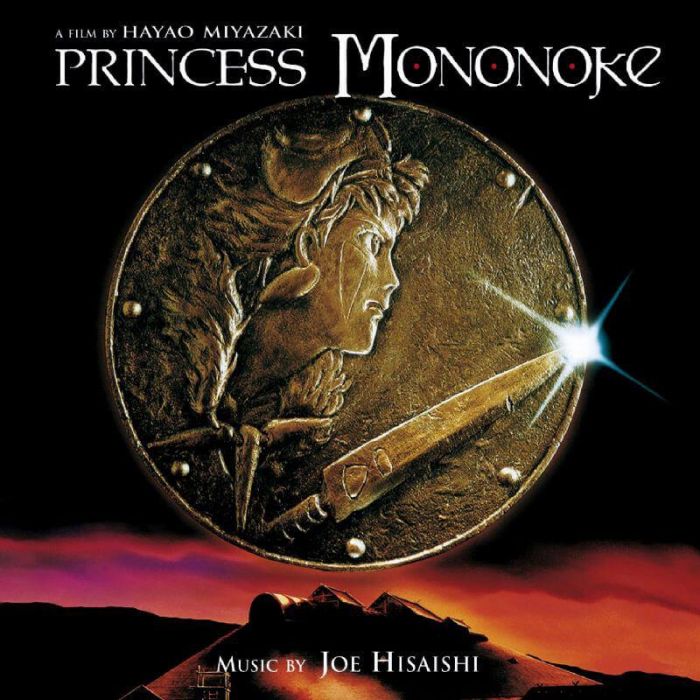Princess Mononoke OST by Joe Hisaishi (Review)

When people think of epic films, there are two genres that are normally not mentioned — kung fu and animation. For an example of epic kung fu movies, check out Tsui Hark’s Once Upon a Time in China. For an epic animated feature — and no, I don’t consider dumbed down Disney shlock as “epic” in any way — look no further than Hayao Miyazaki’s Princess Mononoke. And though I don’t think I’ll live to see the day when I can watch Once Upon a Time in China in a theatre, I consider myself quite blessed that I got the chance to see Princess Mononoke twice in the theatre.
In order for Princess Mononoke to work, it had to accomplish two things. First of all, it had to treat the battle between Man and Nature — between a strong-willed community trying to carve out a living, and ancient gods intent on preserving the old ways — as an epic struggle where neither side can come out unscarred. Second, it had treat its characters as real individuals, with both good and evil sides, and to invest enough in them to make the audience really care about them. Princess Mononoke did so, on both counts.
The film’s soundtrack, composed by Joe Hisaishi, works on the same two levels as well. It has a number of thundering, cacaphonous passages (“The Demon God,” “The Battle in Front of the Ironworks”) that emphasize and mirror the battles depicted in the film. However, it tempers such songs with much more serene and moving ones (“The Journey to the West,” “Princess Mononoke Theme Song”) that echo the beauty and wonder of Miyazaki’s vision, as well the strong characters that are his trademark.
Throughout many of the songs, Hisaishi uses the same vaguely Oriental flute melody; it can be either achingly melancholy or grandiose and sweeping, depending upon the other elements he weaves in. Usually it’s the latter, and while listening to the album, there are several points when I had to suppress a shiver or a sob as a certain scene from the movie came rushing back into my mind.
However, Hisaishi does incorporate other sounds and styles. “Kodamas” is quite playful in a haunted forest spirit sort of way. “The Forest of the Gods” and “Lady Eboshi” are serene and meditative, though darkness lurks just below the surface. “The Tatara Women Work Song,” with its Japanese vocals, has a rural, down-to-earth feel, like voices echoing across the rice paddies at sunrise. Both parts of “The World of the Dead” are all alien voices amidst shrieking strings, whereas “Ashitaka and San” is a tender piano ballad of resolution and hope. The only track that feels out of place is the last version of “Princess Mononoke Theme Song” with its English vocals. Sasha Lazard has a lovely voice, but the lyrics should’ve been left in the original Japanese.
If I had one complaint about the movie, it was that it tended to get a little expositional around the middle. The opening was amazing, and the finale equally so, but around the middle the movie spent a great deal of time fleshing out characters and investigating their motivations. As such, hearing the same basic dialog over and over got a little tedious. The same complaint can be leveled at the soundtrack. There are several times when the use of the same melodies gets a little tedious, but I don’t think this minor complaint should keep you from purchasing this, even if you haven’t seen the movie. There’s enough power behind this soundtrack for five similar movies.
I’m not usually a big fan of soundtracks. I usually find it hard to get interested in the music because, by design, it’s supposed to fade into the background and provide support for the visuals rather than dominate them. But like the Children of Nature soundtrack, the Princess Mononoke soundtrack has ample power to stand on its own, simply because the movie’s nature demanded it to be such.
Hayao Miyazaki gets my highest praise and thanks for creating one of most beautiful and stirring movies I’ve ever seen. Likewise, Joe Hisaishi gets my highest praise and thanks for crafting this lovely music. As I said, if you haven’t seen the movie, the soundtrack is still powerful and moving music. If you have seen the movie, however, then you need to own this release. If anything, it’ll tide you over until Princess Mononoke comes out on video later this year.